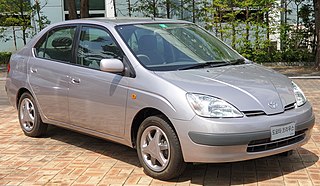
A hybrid vehicle is one that uses two or more distinct types of power, such as submarines that use diesel when surfaced and batteries when submerged. Other means to store energy include pressurized fluid in hydraulic hybrids.
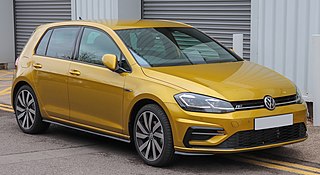
The Volkswagen Golf is a compact car/small family car (C-segment) produced by the German automotive manufacturer Volkswagen since 1974, marketed worldwide across eight generations, in various body configurations and under various nameplates – including as the Volkswagen Rabbit in the United States and Canada, and as the Volkswagen Caribe in Mexico (Mk1).
Global Hybrid Cooperation, formerly Advanced Hybrid System 2 (AHS2), is a set of hybrid vehicle technologies jointly developed by General Motors, Daimler, and Chrysler LLC, with BMW joining in 2005. It uses 2 or 3 planetary gearsets in an automatic transmission: one on the internal combustion engine (ICE) side paired with a second, forming the compound split, and possibly one third additional planetary gearset to multiply the number of fixed gear ratios. General Motors has stopped using the "AHS2" name as of 2006, preferring to call it simply a two-mode hybrid system.
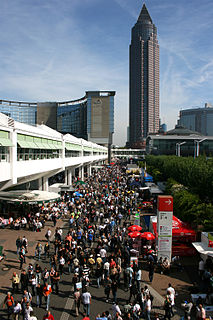
The International MobilityShow Germany or simply International Mobility Show, in German known as the Internationale Automobil-Ausstellung, is the world's largest mobility show. It is held annually, with passenger vehicles, motorcycles and bikes being displayed as the IAA Mobility Show in odd-numbered years in Munich, and IAA Transportation for commercial vehicles in even-numbered years in Hanover, Germany. Before 1991, the show was held solely in Frankfurt.
BAS is a category of automotive parallel hybrid technology that uses an electric motor to contribute power to the internal combustion engine's crankshaft via a serpentine belt. By mounting this motor generator unit in the conventional location traditionally used for the standard automotive alternator, it permits a low-cost method of adding mild hybrid capabilities such as start-stop, power assist, and mild levels of regenerative braking. BAS differ from other mild hybrid systems as they are not run off the vehicle's crankshaft.

Mini is a British automotive marque founded in 1969, owned by German automotive company BMW since 2000, and used by them for a range of small cars assembled in England and Holland. The word Mini has been used in car model names since 1959, and in 1969 it became a marque in its own right when the name "Mini" replaced the separate "Austin Mini" and "Morris Mini" car model names. BMW acquired the marque in 1994 when it bought Rover Group, which owned Mini, among other brands.
Mild hybrids are generally cars with an internal combustion engine equipped with an electric machine allowing the engine to be turned off whenever the car is coasting, braking, or stopped, and then quickly restarted once power is again required. Mild hybrids may employ regenerative braking and some level of power assist to the internal combustion engine (ICE), but mild hybrids do not have an electric-only mode of propulsion.
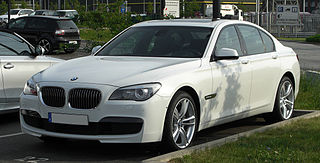
The fifth generation of the BMW 7 Series consists of the BMW F01 and BMW F02 full-size luxury sedans. The F01/F02 generation was produced by BMW from 2008 to 2015 and is often collectively referred to as the F01.
Hybrid vehicle drivetrains transmit power to the driving wheels for hybrid vehicles. A hybrid vehicle has multiple forms of motive power.

The BMW X6 is a mid-size luxury crossover SUV by German automaker BMW. The BMW X6 is the originator of the sports activity coupé (SAC), referencing its sloping rear roof design. It combines the attributes of an SUV with the stance of a coupé. It is built in BMW's North American plant in Greer, South Carolina alongside the BMW X5, whose platform it shares. Prior to the release of the X7, the X6 was considered a flagship SUV for BMW.

The Audi e-tron is a series of electric and hybrid cars shown by Audi from 2009 onwards. In 2012 Audi unveiled a plug-in hybrid version, the A3 Sportback e-tron, released to retail customers in Europe in August 2014, and slated for the U.S. in 2015. A decade after the unveiling of the first e-tron concept at the 2009 International Motor Show Germany, Audi's first fully electric e-tron SUV went into production in 2019.

The history of plug-in hybrid electric vehicles (PHEVs) spans a little more than a century, but most of the significant commercial developments have taken place after 2002. The revival of interest in this automotive technology together with all-electric cars is due to advances in battery and power management technologies, and concerns about increasingly volatile oil prices and supply disruption, and also the need to reduce greenhouse gas emissions. Between 2003 and 2010 most PHEVs on the roads were conversions of production hybrid electric vehicles, and the most prominent PHEVs were aftermarket conversions of 2004 or later Toyota Prius, which have had plug-in charging and more lead-acid batteries added and their electric-only range extended.

Audi hybrid vehicles are hybrid electric vehicles created by the German carmaker, Audi. Some vehicles listed were concept vehicles, which utilised an internal combustion engine and an electric motor, and were used for research and development (R&D) for potential future use of the technology into possible series production. Audi launched its first hybrid concept car in 1989 called the Audi Duo, and was the first European company to sell a hybrid in 1997, though only in very small numbers.

The Mercedes-Benz BlueZERO concept is Mercedes' attempt at the alternative fuel vehicle movement. The BlueZERO is a flexible concept that has the ability to accommodate the three different types of future alternative fuels: electric, hybrid, and hydrogen fueled. It was first introduced at the 2009 Detroit Auto Show which took place January 11–25. It features a single vehicle architecture that accommodates three models with different electric power-train configurations, each of which are fully developed and ready for testing. The Mercedes-Benz BlueZERO electric drive system gives each model the same performance specifications for acceleration and top speed. The Mercedes-Benz BlueZERO electric drive modular design accelerates from 0 to 100 km/h (62.5 mph) in under 11 seconds, and the top speed is electronically governed to 150 km/h (93 mph) in the interests of optimal range and energy efficiency. Peak torque is 320 N⋅m (236 lb⋅ft) and as with all EVs, maximum torque is available from zero rpm.

The BMW i8 is a plug-in hybrid sports car developed by BMW. The i8 was part of BMW's electrified fleet and was marketed under the BMW i sub-brand. The production version of the BMW i8 was unveiled at the 2013 Frankfurt Motor Show and was released in Germany in June 2014. Deliveries to retail customers in the U.S. began in August 2014. A roadster variant was launched in May 2018. Production ended in June 2020.

The BMW i is a sub-brand of BMW founded in 2011 to design and manufacture plug-in electric vehicles. The company initially released two vehicles: the i3 all-electric car and the i8 plug-in hybrid. The all-electric iX3 SUV was released in late 2020, while iX SUV and the i4 all-electric liftback sedan followed later in 2021.

The BMW 2 Series Active Tourer is a two-row subcompact executive MPV produced by BMW since August 2014. The closely related BMW 2 Series Gran Tourer is a longer three-row version which began production in 2015. Marketed as part of the 2 Series range, the F45/F46 are based on the front-wheel-drive UKL2 platform. The design is based on the BMW Concept Active Tourer, and is mechanically related to the MINI Countryman, also built by BMW.
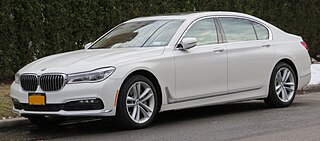
The sixth generation of the BMW 7 Series consists of the BMW G11 and BMW G12 luxury saloons. The G11/G12 generation has been produced by BMW since 2015, and is often collectively referred to as the G11.

The Audi Q8 is a mid-size luxury crossover SUV coupé made by Audi that was launched in 2018. It is the flagship of the Audi SUV line, and is being produced at the Volkswagen Bratislava Plant.

The second generation of the BMW 4 Series consists of the BMW G22 along with the BMW G23 and BMW G26 compact executive cars. The G22 4 Series was launched in June 2020 and succeeds the F32 4 Series.

















